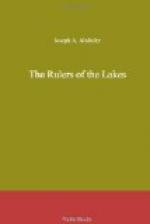“I’m most sorry, Mr. Martinus, that we did not succeed in capturing your burglar last night, but my Onondaga friend followed him to the river, which he swam, then escaping. ’Tis true that he escaped, but nevertheless Tayoga salvaged a piece of a letter that he destroyed as he ran, and upon the fragment was written a name which we’re quite sure was that of the bold robber.”
Robert paused, and he saw the face of Martinus whiten.
“You do not ask me the name, Mynheer Martinus,” he said. “Do you feel no curiosity at all about it?”
“What was it?” asked Martinus, thickly.
“Achille Garay.”
Martinus trembled violently, but by a supreme effort controlled himself.
“I never heard it before,” he said. “It sounds like a French name.”
“It is a French name. I’m quite confident of it. I merely wanted you to understand that we haven’t lost all trace of your robber, that we know his name, and that we may yet take him.”
“It does look as if you had a clew,” said Martinus. He was as white as death, though naturally rubicund, and without another word he walked on. Robert looked after him and saw the square shoulders drooping a little. He had not the slightest doubt of the man’s guilt, and he was filled with indignant wonder that anyone’s love of money should be strong enough to create in him the willingness to sell his country. He was sure Mynheer Jacobus was right. Martinus was sending their military secrets into Canada for French gold, and yet they had not a particle of proof. The man must be allowed to go his way until something much more conclusive offered. Both he and Tayoga talked it over with Willet, and the hunter agreed that they could do nothing for the present.
“But,” he said, “the time may come when we can do much.”
Then Martinus disappeared for a while from Robert’s mind, because the next day he met the famous old Indian known in the colonies as King Hendrik of the Mohawks. Hendrik, an ardent and devoted friend of the Americans and English, had come to Albany to see Colonel William Johnson, and to march with him against the French and Indians. There was no hesitation, no doubt about him, and despite his age he would lead the Mohawk warriors in person into battle. Willet, who had known him long, introduced Robert, who paid him the respect and deference due to an aged and great chief.
Hendrik, who was a Mohegan by birth but by adoption a Mohawk, adoption having all the value of birth, was then a full seventy years of age. He spoke English fluently, he had received education in an American school, and a substantial house, in which he had lived for many years, stood near the Canajoharie or upper castle of the Mohawks. He had been twice to England and on each occasion had been received by the king, the head of one nation offering hospitality to the allied head of another. A portrait of him in full uniform had been painted by a celebrated London painter.




